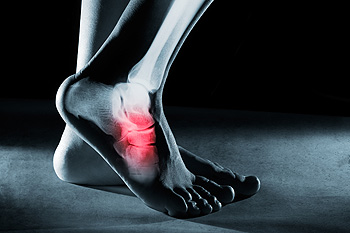
Multiple hereditary exostoses, or MHE, is a rare genetic disorder characterized by the development of multiple benign bone tumors, called osteochondromas, on the bones of the skeleton. These growths typically appear during childhood and adolescence and can affect various bones, including those in the feet and ankles. In the feet, MHE may lead to deformities, such as toe angulation, limb length discrepancies, and altered gait patterns. This can result in pain, limited mobility, and cosmetic concerns. If you have the symptoms described here, it is strongly suggested that you schedule an appointment with a podiatrist who can diagnose the problem and provide appropriate treatment. If it is an MHE-related foot and ankle issue, the podiatrist will determine if custom-made orthotic interventions that can provide support and improve foot function will be helpful, or if surgical interventions need to be performed that can correct deformities or remove problematic osteochondromas. If you have been afflicted with this rare foot condition, it is suggested that you are under the care of a podiatrist who can help you manage MHE.
Some foot conditions may require additional professional care. If you have any concerns, contact one of our podiatrists of Podiatry Care Specialists. Our doctors can provide the care you need to keep you pain-free and on your feet.
Rare Foot Conditions
The majority of foot conditions are common and can be treated by a podiatrist. Standard diagnostic procedures are generally used to identify specific conditions and treatment can be rendered. A podiatrist also treats rare foot conditions which can be difficult to diagnose and may need extra attention and care.
There are many rare foot conditions that can affect children. Some of these can include:
- Freiberg’s disease
- Kohler’s disease
- Maffucci syndrome
Freiberg’s disease - This can be seen as a deterioration and flattening of a metatarsal bone that exists in the ball of the foot. It typically affects pre-teen and teenage girls, but can affect anyone at any age. Symptoms that can accompany this can be swelling, stiffness, and the patient may limp.
Kohler’s disease - This often targets the bone in the arch of the foot and affects younger boys. It can lead to an interruption of the blood supply which ultimately can lead to bone deterioration. The patient may limp or experience tenderness, swelling, and redness.
Maffucci syndrome - This affects the long bones in a child’s foot leading to the development of abnormal bone lesions. They are benign growths and typically develop in early childhood and the bones may be susceptible to breaking.
A podiatrist can properly diagnose and treat all types of rare foot conditions. If your child is affected by any of these symptoms or conditions, please don’t hesitate to call our office so the correct treatment method can begin.
If you have any questions please feel free to contact our offices located in West Chester, and Broomall, PA . We offer the newest diagnostic tools and technology to treat your foot and ankle needs.
